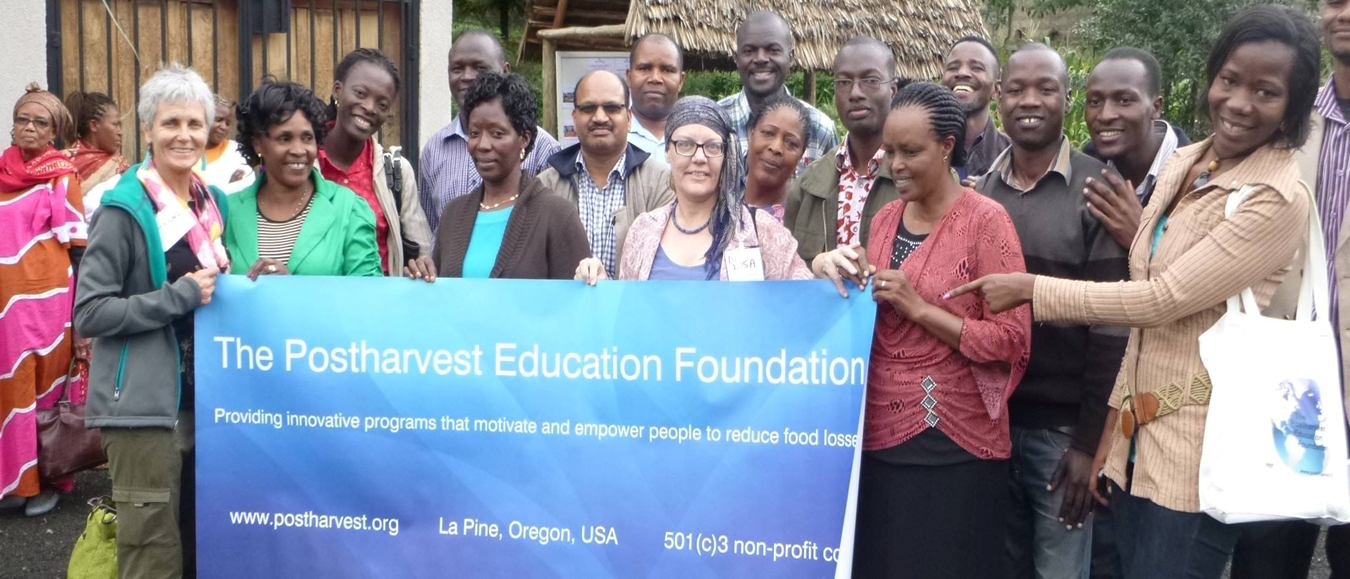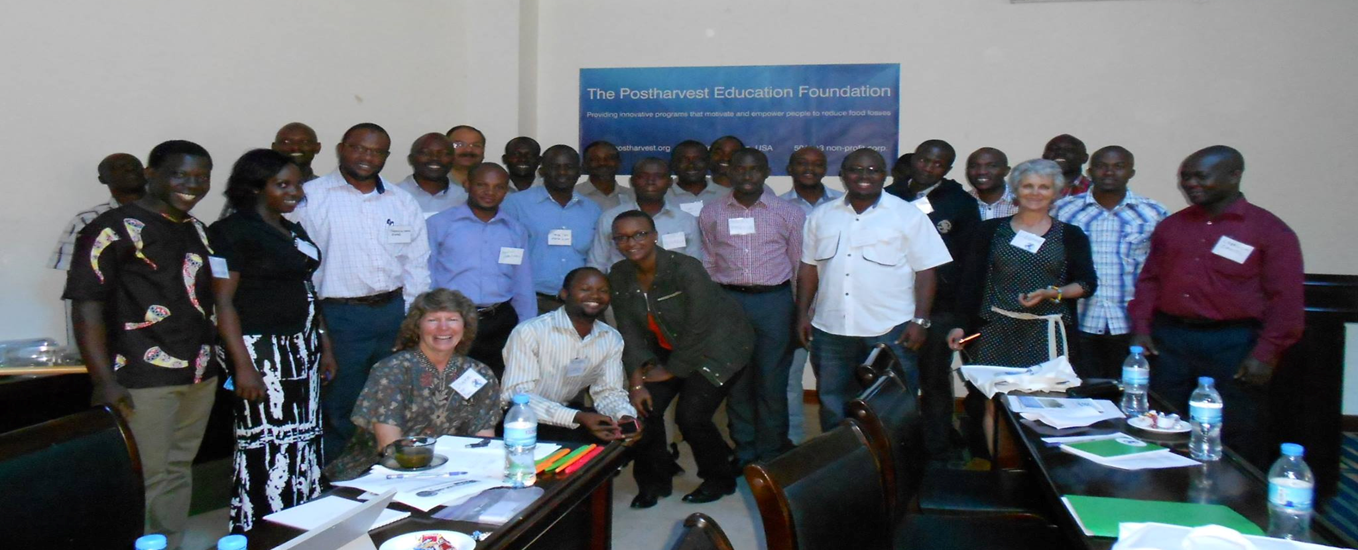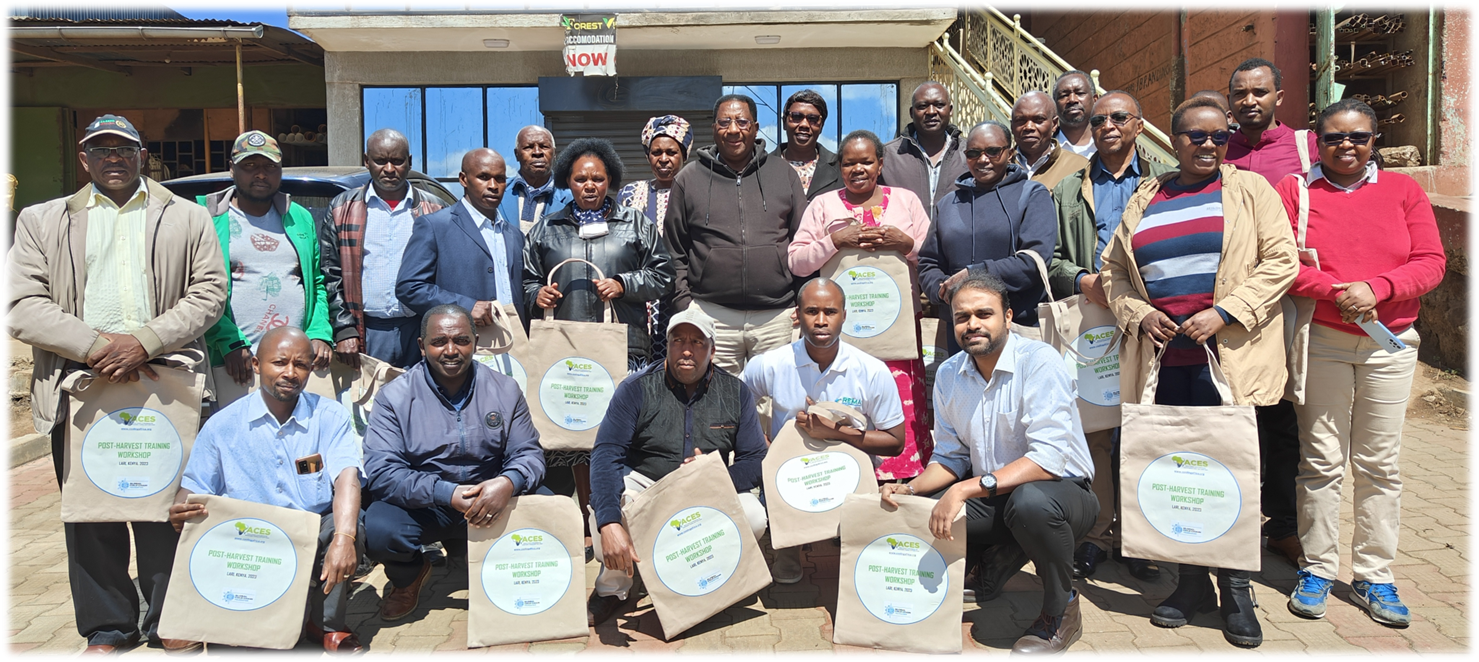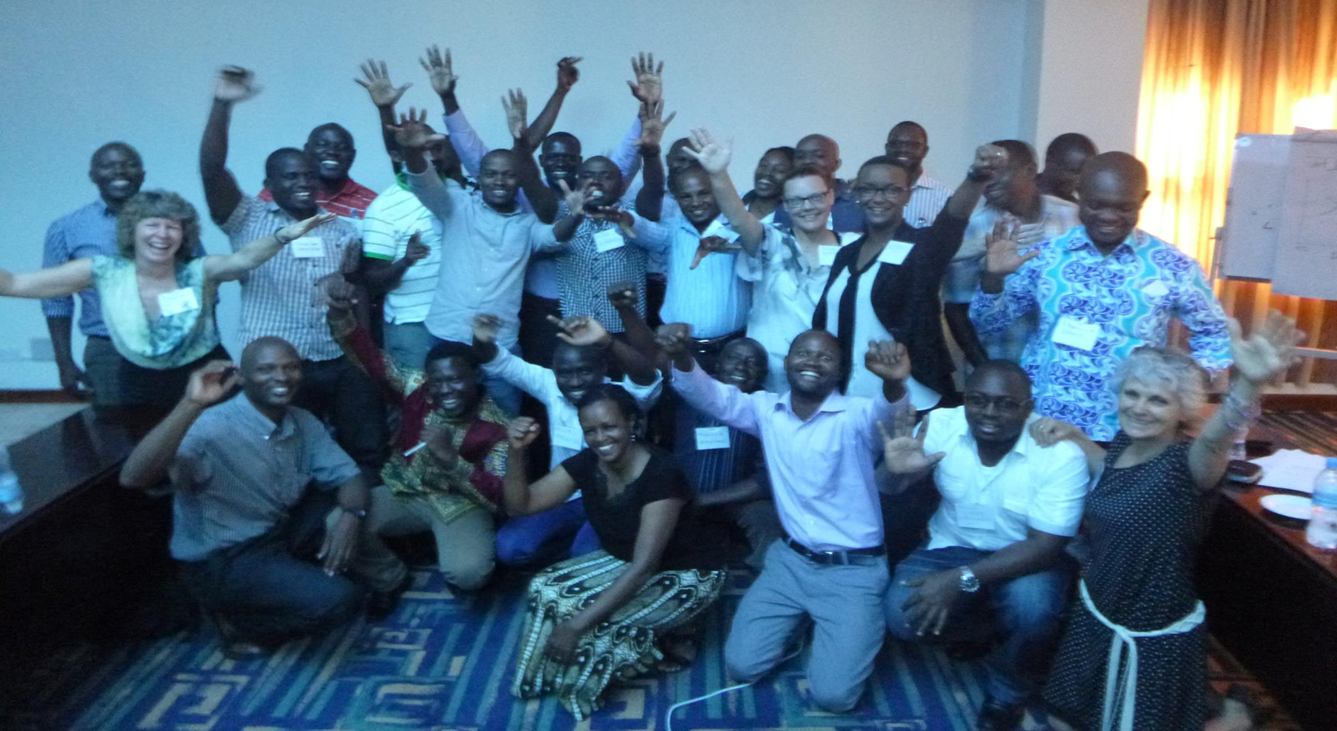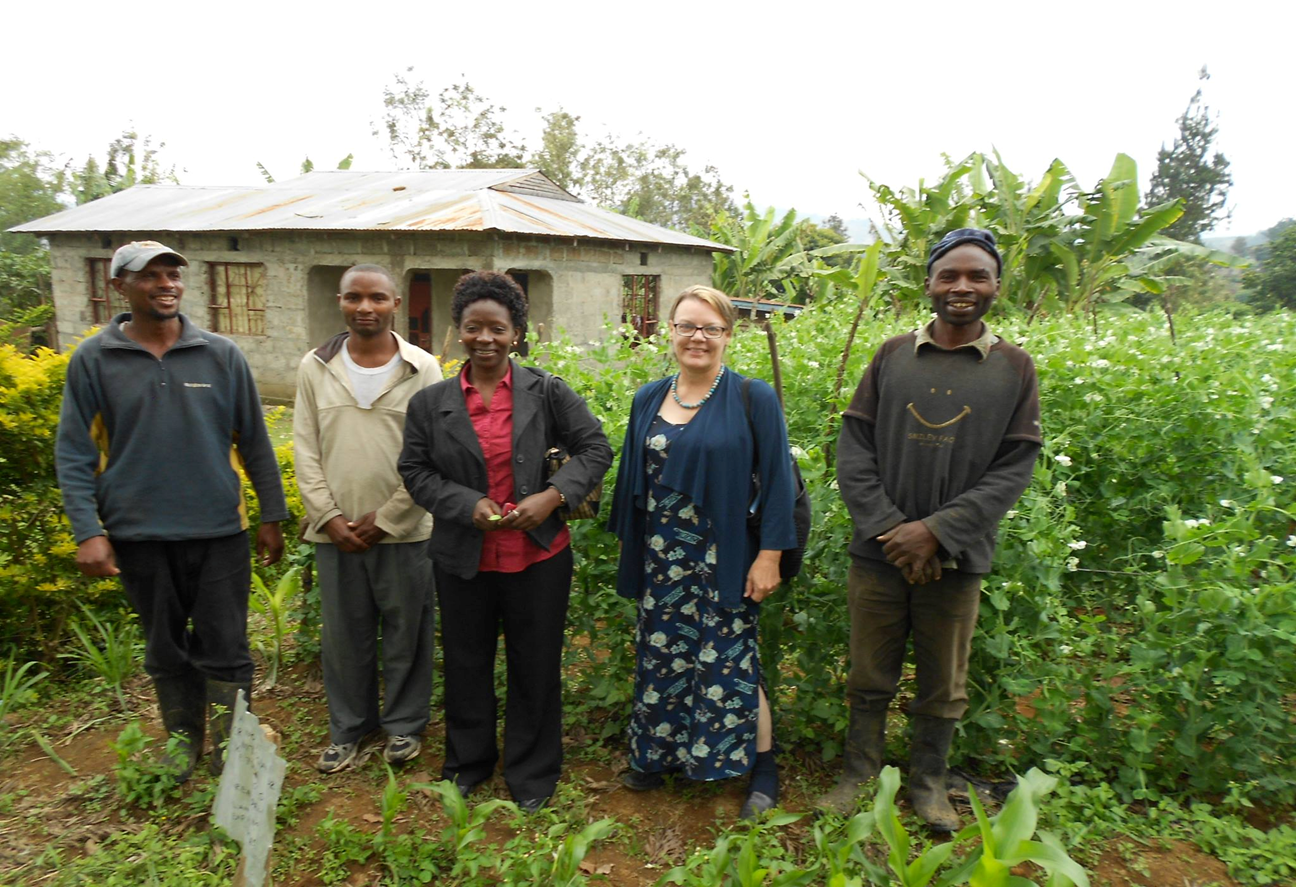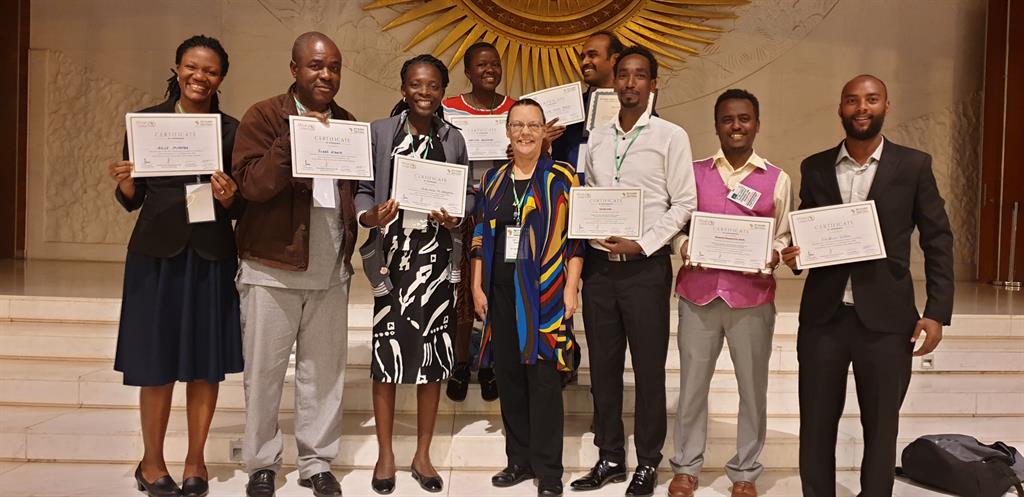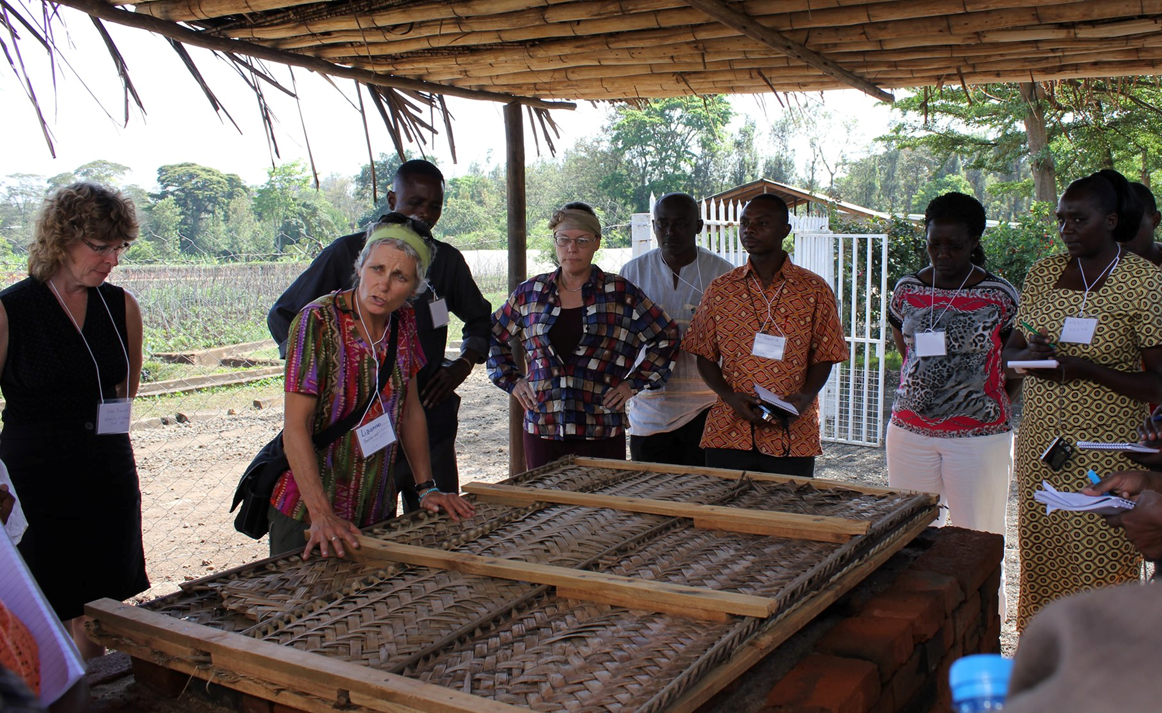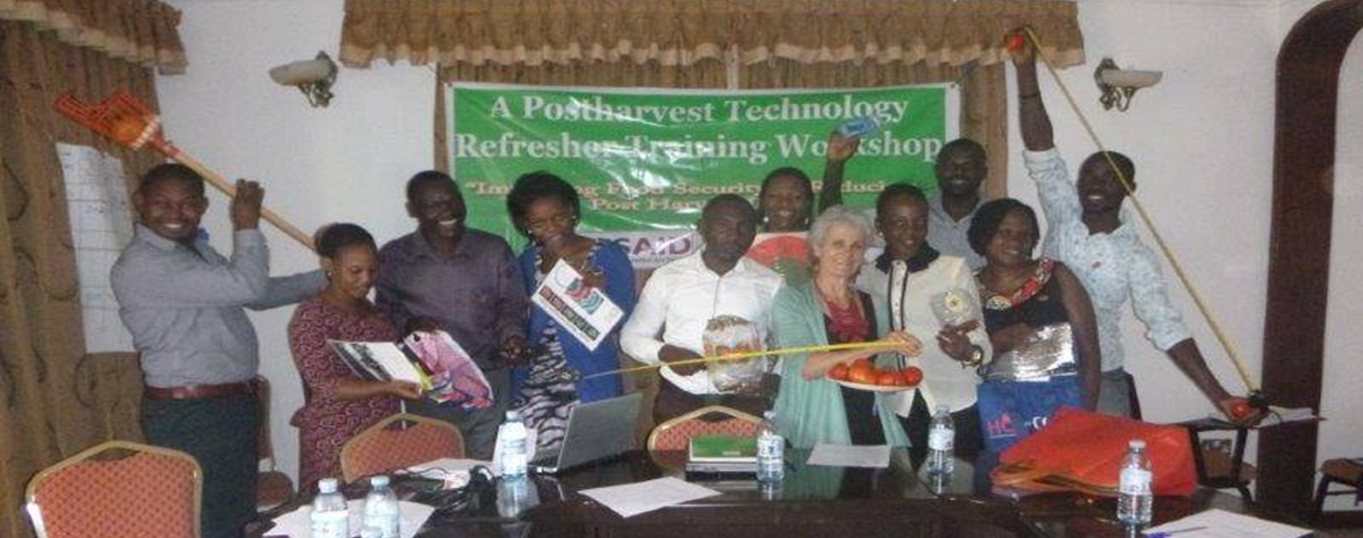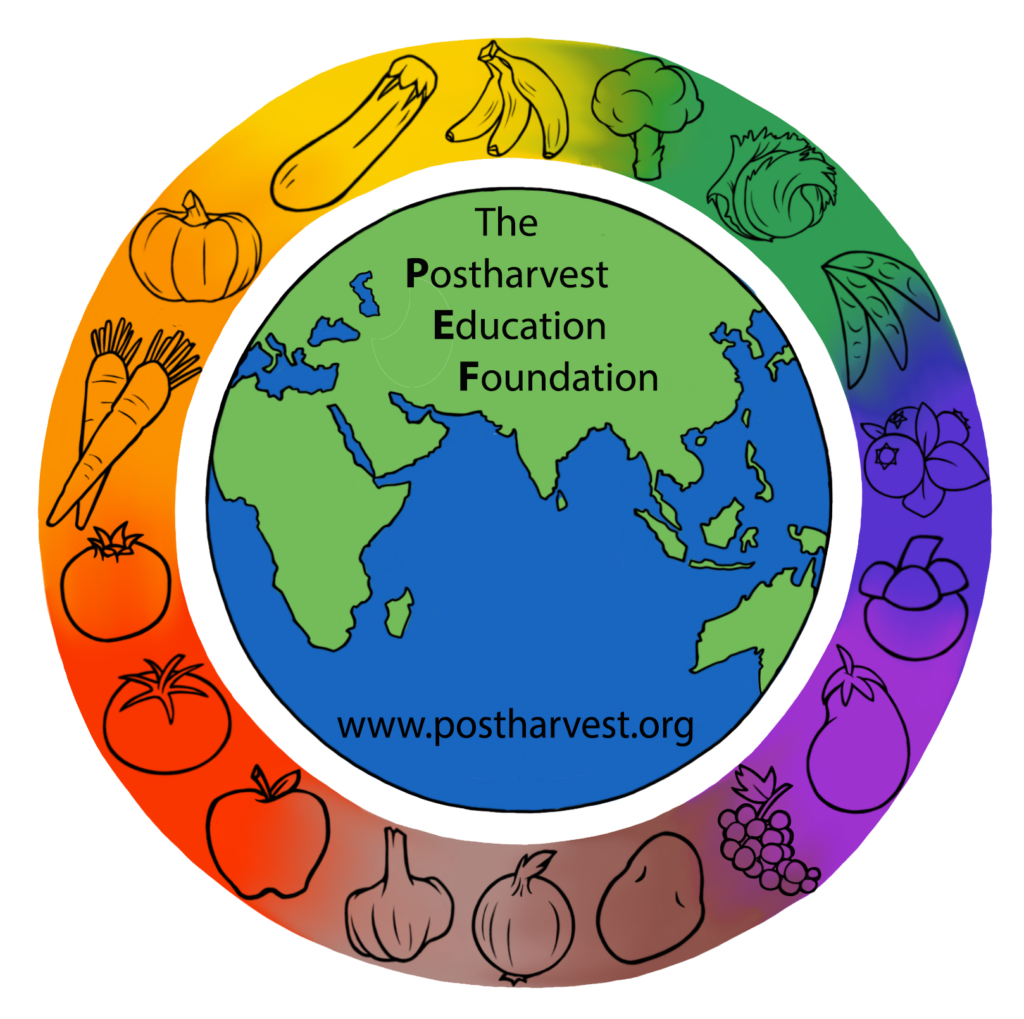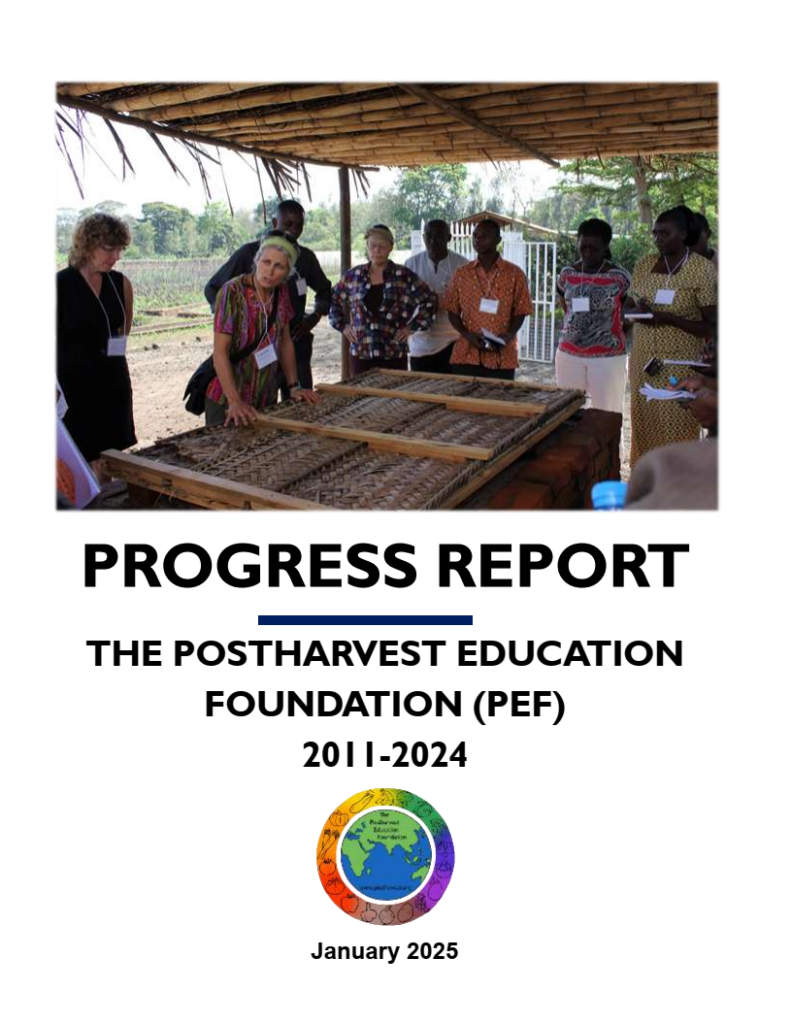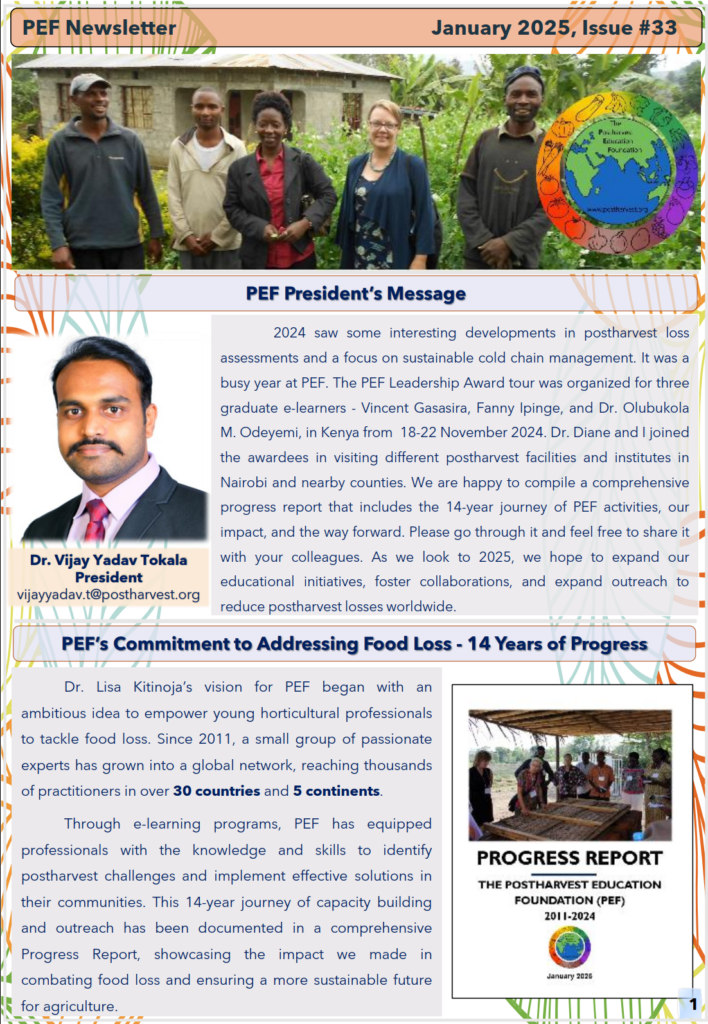PEF has published many articles, manuals, presentations and training aids that you are welcome to download and utilize for developing your own training programs and workshops. Our board members have shared many of their favorite resources and documents. FREE to Download and Share.
MANUALS
100 under $100: Tools for Reducing Postharvest Losses (Teutsch & Kitinoja, 2019). When the PEF website was updated in 2023, many of the links in this book were disconnected. Please feel free to ask for the new links, or check the book’s resources folder on the PEF Google Drive. PEF has posted digital documents referenced in 100 Under $100 Resources and References 2018 [bit.ly/2BUKfVr], via Google Drive as
primary resources for readers.

Small-Scale Postharvest Handling Practices: A Manual for Horticultural Crops (Kitinoja & Kader, 2015) is available for download (pdf format) from the UC Davis website, free of charge, and is now in 12 languages! https://postharvest.ucdavis.edu/publication-category/small-scale-postharvest-technology

Efficiency for Access, International Institute of Refrigeration. (2023). WALK-IN COLD ROOMS, A PRACTITIONER’S TECHNICAL GUIDE – Design and Operation of Walk-In Cold Rooms for Precooling and Storage of Fresh Produce in Hot Climates, in Off-Grid and Unreliable Grid Situations. (pdf 89MB)
https://iifiir.org/en/fridoc/walk-in-cold-rooms-a-practitioner-s-technical-guide-design-and-148065

PEF E-Learning Manual (2021). Free to download and begin the self-guided training of trainers program at any time. DOWNLOAD Ten assignments on how to find postharvest information and resources, how to perform loss assessments, cost-benefits analysis, designing demos, designing training programs and more.
PEF Reducing Postharvest Losses Manual and PPTs for Sub Saharan Africa (2021) — postharvest handling and up to date information on grains/staple crops, roots/tuber crops and fruits/vegetable crops. PEF MANUAL; Intro PPT; PPT on grains/staples; PPT on roots/tubers; PPT on fruits/vegetables.
Food Loss and Waste Value Chain Selection Guide (2022). How to assess FLW factors and identify a crop value chain for programs and projects. Excellent resource for writing a proposal.

Evaporative Cooling Best Practices Guide (2018). (via MIT D-Lab and Kukom Edoh Ognakossan)

Commodity Systems Assessment Methodology: CSAM is a method we use for training of trainers, in which an e-learner or workshop participant collect data on the causes and sources of postharvest losses and quality problems. Each trainee chooses a crop of interest for their home country and spends several weeks doing a literature review, interviewing farmers, traders and marketers, and summarizing the findings across 25 components along the value chain from the farm to the market.
LaGra, J., Kitinoja L. and K. Alpizar (2016). Commodity Systems Assessment Methodology for Value Chain Problem and Project Identification: A first step in food loss reduction. San Jose, Costa Rica: IICA. 246 pp. [PDF(English)]
LaGra, J., Kitinoja L. and K. Alpizar (2016). Metodología de evaluación de cadenas agroalimentarias para la identificación de problemas y proyectos: un primer paso para la disminución de pérdidas de alimentos San Jose, Costa Rica: IICA. 246 pp. [PDF (Spanish)]
BOOKS
Postharvest Extension and Capacity Building for the Developing World
2018 Edited By Majeed Mohammed, Vijay Yadav Tokala
Cold Chain Management for the Fresh Produce Industry in the Developing World
2021 Edited By Vijay Yadav Tokala, Majeed Mohammed
ARTICLES
CERES 2030 Project findings. Stathers, T., Holcroft, D., Kitinoja, L. et al. A scoping review of interventions for crop postharvest loss reduction in sub-Saharan Africa and South Asia. Nature Sustainability (2020). https://doi.org/10.1038/s41893-020-00622-1
Kodjogbe, G. (2020). Postharvest Losses Reduction on Vegetables Supply Chain in West Africa. Agriculture Observer, 1(4): 34-41. http://www.agricultureobserver.com/downloadfile21.aspx?id=124
Kitinoja, L., V.Y. Tokala and M. Mohammed. 2019. Clean cold chain development and the critical role of extension education. Agriculture for Development. 36: 19-24.
Kitinoja. L., Odeyemi, O.M., Dubey, N., Musanase, S., and G.S. Gill (2019). Commodity system assessment studies on the postharvest handling and marketing of tomatoes in Nigeria, Rwanda and Maharashtra, India. Journal of Horticulture and Postharvest Research 2019(2):1-14. Special Issue: Postharvest Losses of Horticultural Crops. http://jhpr.birjand.ac.ir/article_957_5afb3d08c14f821c742ccc4161b6ae51.pdf
Kitinoja, L., V.Y. Tokala and A. Brondy. 2018. A review of global postharvest loss assessments in plant-based food crops: recent findings and measurement gaps. Journal of Postharvest Technology. 6(4): 1-15. (+) Databases and references (hundreds of studies) used for the review. Link to Google Drive– just click to open the folders: [Download] Database 1: PHLs by crop and country. Database 2: Annotated reference list.
Kitinoja, L., V.Y. Tokala and A. Brondy. 2018. Challenges and opportunities for improved postharvest loss measurements in plant-based food crops. Journal of Postharvest Technology. 6(4): 16-34.
Kitinoja, L., Spang, N., Gillman, A., Pearson, P., McBride, M. Prezkop, L. (2018). Maximizing Farm Resources and Edible Food Rescue. Specialty Crop Loss Report. World Wildlife Fund.
WWF (2018). No Food Left Behind. World Wildlife Fund. (Dr Lisa was a contributing author to this World Wildlife Fund Report.)
Kitinoja, L. (2016). “Innovative Approaches to Food Loss and Waste Issues”, Brookings Institute: Ending Rural Hunger Report.
USDA (2016). Handbook 66: The Commercial Storage of Fruits, Vegetables, and Florist and Nursery Stocks. https://www.ars.usda.gov/ARSUserFiles/oc/np/CommercialStorage/CommercialStorage.pdf
Lipinski, B. et al (2013). Creating a Sustainable Food Future, Installment Two: Reducing Food Loss and Waste. (Dr Lisa was a contributing author to this World Resources Institute working paper.)
RECENT PRESENTATIONS
Vijay Yadav Tokala & Olubukola Odeyemi (2023). Postharvest Loss Management and Gender Equity (Jaipur National University, India).
Vijay Yadav Tokala & Lisa Kitinoja (2022) – Reducing postharvest food waste by upcycling into innovative food products (ESCON).
Deirdre Holcroft (2022) – The Postharvest Education Foundation – what we do.
Vijay Yadav Tokala (2021) – Cold chain management – current status and scope in India (AEEE).
Vijay Yadav Tokala (2021) – Postharvest management to ensure food security and the critical role of capacity building (ECHO).
Lisa Kitinoja (2019) – SDG 2&12: Reducing Food Loss/Waste (ppt for the Zoom webinar for University of Pennsylvania, 23 Sept 2019)
Odeyemi and Kitinoja (2019) – Cold Chain Development Success: Special considerations when handling fresh produce (OTACCWA Cold Chain Summit)
Tokala V.Y. & Mohammad M. (2019)- Postharvest extension and capacity building for the developing world.
Holcroft & Kitinoja (2018) – The Postharvest Education Foundation’s Role in Reducing Postharvest Losses (Poster for 12th International Working Conference on Stored Product Protection, Berlin. 7-11 October, 2018).
WHITE PAPERS
| Year | Authors | Title | Citation | |
| 2022 | Deirdre Holcroft | Design Improvements for Applied Postharvest Studies | Holcroft, D. (2022). Design improvements for applied postharvest studies. PEF White Paper No. 22-01. La Pine, Oregon, USA: The Postharvest Education Foundation | [Download] |
| 2020 | Deirdre Holcroft and Lisa Kitinoja | Fresh produce food safety risks and their mitigation | Holcroft, D. and L. Kitinoja (2020). Fresh produce food safety risks and their mitigation. PEF White Paper No. 20-01. La Pine, Oregon, USA: The Postharvest Education Foundation | [Download] |
| 2019 | Robert Nshizirungu and Lisa Kitinoja | Tomato Postharvest Management in Rwanda | Nshizirungu, R. and L. Kitinoja (2019). Tomato Postharvest Management in Rwanda. PEF White Paper No. 19-04. La Pine, Oregon, USA: The Postharvest Education Foundation. | [Download] |
| 2019 | Frederick Mba | A survey on pineapple quality problems and postharvest losses in Benin | Mba, F. (2019). A survey on pineapple quality problems and postharvest losses in Benin. PEF White Paper 19-03. La Pine, Oregon (USA): The Postharvest Education Foundation. | [Download] |
| 2019 | Mohamed M. El-Mogy and Lisa Kitinoja | Review of best postharvest practices for fresh market green beans | El-Mogy, M.M and L. Kitinoja (2019). Review of best postharvest practices for fresh market green beans. PEF White Paper No. 19-01. La Pine, Oregon, USA: The Postharvest Education Foundation. | [Download] |
| 2018 | Thomas Buyinza and Lisa Kitinoja | Commodity Systems Assessment of Cassava in Uganda | Buyinza, T. and L. Kitinoja (2018). Commodity Systems Assessment of Cassava in Uganda. PEF White Paper No. 18-01. La Pine, Oregon, USA: The Postharvest Education Foundation. | [Download] |
| 2018 | Deirdre Holcroft | Curing and Storage of Tropical Roots, Tubers and Corms to Reduce Postharvest Losses | Holcroft, D. (2018). Curing and Storage of Tropical Roots, Tubers and Corms to Reduce Postharvest Losses. PEF White Paper No. 18-02. La Pine, Oregon, USA: The Postharvest Education Foundation. | [Download] |
| 2015 | Deirdre Holcroft | Water Relations in Harvested Fresh Produce | Holcroft, D. (2015). Water Relations in Harvested Fresh Produce. PEF White Paper No. 15-01. La Pine, Oregon, USA: The Postharvest Education Foundation. | [Download] |
| 2015 | Lisa Kitinoja and Adel A. Kader | Measuring Postharvest Losses of Fresh Fruits and Vegetables in Developing Countries | Kitinoja, L. and A.A. Kader (2015). Measuring Postharvest Losses of Fresh Fruits and Vegetables in Developing Countries. PEF White Paper No. 15-01. La Pine, Oregon, USA: The Postharvest Education Foundation. | [Download] |
| 2014 | Diane M. Barrett | Creating Fruit and Vegetable Postharvest Technology Videos | Barrett D. M. (2014). Creating Fruit and Vegetable Postharvest Technology Videos. PEF White Paper No. 14-01. La Pine, Oregon, USA: The Postharvest Education Foundation. | [Download] |
| 2013 | Lisa Kitinoja | Returnable Plastic Crate (RPC) systems can reduce postharvest losses and improve earnings for fresh produce operations | Kitinoja, L. (2013). Returnable Plastic Crate (RPC) Systems Can Reduce Postharvest Losses and Improve Earnings for Fresh Produce Operations. PEF White Paper No. 13-01. La Pine, Oregon, USA: The Postharvest Education Foundation. | [Download] |
| Appendix A: RPC Cost-Benefit calculator worksheet | [Download] | |||
| 2013 | Harvey C. Neese; Thomas V. Dechert; Robert J. (Bob) Haggerty; James McCullough; Judith Edmister; Jerry La Gra and Lisa Kitinoja | Gathering Data to Address Postharvest Loss Challenges: Commodity Systems Assessment Methodology | Neese, H.C. et al (2013). Gathering Data to Address Postharvest Loss Challenges: Commodity Systems Assessment Methodology. PEF White Paper No. 13-02. La Pine, Oregon, USA: The Postharvest Education Foundation. | [Download] |
| 2013 | Lisa Kitinoja | Use of Cold Chains for Reducing Food Losses in Developing Countries | Kitinoja, L. (2013). Use of Cold Chains for Reducing Food Losses in Developing Countries. PEF White Paper No. 13-03. La Pine, Oregon, USA: The Postharvest Education Foundation. | [Download] |
| 2011 | Devon Zagory | The Building Blocks of a Food Safety Program | Zagory, D. (2011). The Building Blocks of a Food Safety Program. Produce Marketing Association (PMA). Included with permission. | [Download] |
POSTHARVEST INNOVATIONS PLAN Series (2017) — (Low cost, small-scale practices for reducing postharvest food losses). https://drive.google.com/drive/folders/1n_4-ocdWpDRWHI4Eo1JlXawpUSATng0k?usp=drive_link
| 1. | Shade Structures | ||
| 2. | Sizing Rings | ||
| 3. | Harvesting Bags | ||
| 4. | Color Charts | ||
| 5. | Sorting/ Grading/ Packing Table | ||
| 6. | Zero Energy Cool Chamber (ZECC) (100kg model) | ||
| 7. | Zero Energy Cool Chamber (ZECC) (1 MT model) | ||
| 8. | Portable Forced Air Coolers | ||
| 9. | Produce Washing Stations | ||
| 10. | COOLBot™ Equipped Small Scale Cold Room | ||
| 11. | Solar Dryers – inexpensive direct models | ||
| 12. | Solar Dryers – improved indirect models | ||
| 13. | Field Packing | ||
| 14. | Insulated Shipping Containers | ||
| 15. | Dry Food Storage Containers | ||
| 16. | Insulated Packages – Liners and Covers | ||
| 17. | Package Liners and Dividers | ||
| 18. | Curing Root and Tuber Crops | ||
| 19. | Curing Bulb Crops | ||
| 20. | On-farm Storage for Fruits and Vegetable Crops |
LINK to Google Drive folder of “PEF website files” (includes PI Plans Series, PEF White Papers and many other manuals and articles)
